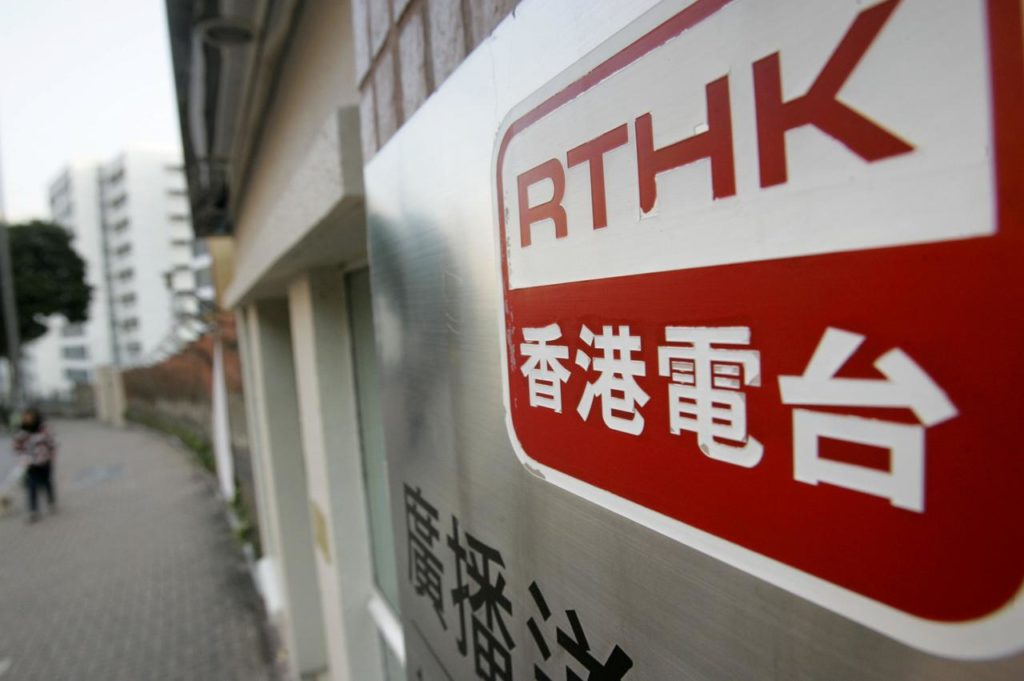Hong Kong’s Free Media Fears Being Silenced By China
Jun 5, 2020 | Pratirodh Bureau
FILE PHOTO: A woman walks past the television house of Radio Television Hong Kong in Hong Kong, China on January 28, 2007
When a team of producers at Radio Television Hong Kong (RTHK) heard on May 19 that the publicly funded broadcaster planned to axe one of its most popular weekly shows, they rushed to the building next door to confront the station’s head.
A group of about 20 producers and other employees from RTHK’s TV and radio operations barged into a conference room where Leung Ka-wing, director of broadcasting, was meeting with top executives.
Some staff demanded to know why the satirical and current affairs television show “Headliner” – which had drawn official complaints after poking fun at the Hong Kong police in an episode in February – was being cancelled, and whether the move was prompted by pressure from authorities.
The impromptu meeting lasted about 90 minutes, during which several staffers cried and raised their voices, according to three people present. Leung said he took the decision to cancel the show in order to “protect RTHK” and its staff, according to the three people.
As conversations continued inside the conference room, RTHK announced it was suspending production of the Chinese-language show, which had been running since 1989, at the end of the current season. RTHK apologized to anyone offended by the station’s output but did not give a reason for the suspension.
Leung, 67, who made his name in broadcasting during the Tiananmen Square crackdown on pro-democracy protesters in Beijing in 1989, declined to answer Reuters’ questions about the meeting. He denied making the comment about protecting RTHK, according to RTHK spokeswoman Amen Ng. Other executives in the meeting that Reuters could identify did not reply to requests for comment.
Hong Kong’s government did not comment on whether it had pressured Leung to cancel the show.
RTHK, founded in 1928 and sometimes compared to the British Broadcasting Corporation, is the only independent, publicly funded media outlet on Chinese soil. It is guaranteed editorial independence by its charter.
The cancellation of “Headliner” has prompted fear among some journalists that mounting pressure from the Hong Kong government and Beijing will destroy that independence.
Hong Kong reached boiling point last summer as millions of pro-democracy protesters took to the streets and some of them clashed violently with police, posing one of the biggest challenges to China’s leader Xi Jinping since he came to power in 2012.
In response to the protests, China said last month it would introduce national security legislation in Hong Kong to prohibit secession, subversion and external interference. More than a dozen people working at RTHK and other media organizations told Reuters they fear that legislation could be used to silence or shut down independent media in the territory.
The situation is like being under the blade of a guillotine, said Jimmy Lai, the publisher of Hong Kong’s pro-democracy Apple Daily newspaper, which like RTHK, has for years drawn the ire of Hong Kong’s government and Beijing: “There’s no half-way. It’s falling.”
Lai, 72, has been repeatedly denounced by state-run Beijing media and pro-China media in Hong Kong, painting him as the local face of what they describe as a U.S. interference campaign. He has been arrested twice this year on charges of illegal assembly related to protests last year.
Lai and some other members of the media fear the new legislation – which has not yet been set out in detail – will make Hong Kong more like mainland China, where the ruling Communist Party runs or controls the vast majority of media and routinely censors dissenting views. The country imprisoned at least 48 journalists last year, more than any other country, according to the Committee to Protect Journalists.
Hong Kong’s leader Carrie Lam has denied the new legislation would curtail media freedom, saying last month that “freedom of expression, freedom of protest, freedom of journalism, will stay.” Hong Kong is guaranteed freedom of speech and the press under Article 27 of the Basic Law, the mini-constitution agreed by China when it took back control of the former British colony in 1997.
A spokesperson for China’s Ministry of Foreign Affairs told Reuters the proposed legislation “only targets activities related to subversion, separatism, terrorism and foreign interference into Hong Kong affairs,” and that it will “not affect freedom of speech, media freedoms, or any other rights and freedoms.”
China’s Liaison Office in Hong Kong, Beijing’s official base in the city, did not reply to requests for comment on whether China sought to control or suppress RTHK or if the new national security legislation would curtail media freedom in Hong Kong.
